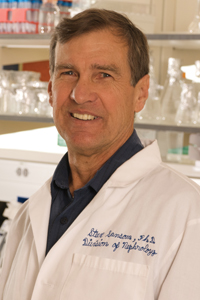 |
Steve Sansom, Ph.D. |
NOTE: This profile is part of a series highlighting the 23 researchers who were named UNMC Distinguished Scientists or New Investigators for 2008. Each of these researchers will be profiled in UNMC Today leading up to a March 16 ceremony to recognize their achievements.
- Name: Steve Sansom, Ph.D.
- Title: Professor in the department of cellular and integrative physiology
- Joined UNMC: 1997
- Hometown: Santa Monica, Calif.
Describe your research in laymen terms, please.
My laboratory studies how diabetes affects the kidneys and how hormones maintain a normal blood potassium concentration by regulating proteins in the kidney.
What led you to pursue this area of research?
When I started graduate school, I was interested in how substances moved across cell membranes. My graduate school adviser studied the cellular mechanism by which aldosterone caused the secretion of potassium ions in the kidneys. I’ve been interested in this topic since graduate school.
How do you see your research contributing to science?
Hypertension is an important disorder that often leads to stroke or heart failure. Some pharmaceutical agents that are used to treat hypertension cause a dangerous imbalance of Na and K ions in our body. My research contributes to our understanding of how certain proteins in specialized cells of the kidneys are used to control the fluid and electrolyte balance of our body. By fully understanding how these proteins function we can devise better pharmacological therapies that will control blood pressure and also maintain a correct balance of Na and K ions.
Why did you become a scientist?
When I took the general requirement courses during my first year of college, my best teachers taught my chemistry, biology and physics classes. Because of these great instructors I became very interested in all aspects of science. I was especially inspired by my chemistry teacher. I realized that wanted to work as a research scientist when we had a guest lecturer in biochemistry class who told us about his investigative research on how insulin caused glucose to enter cells. I thought that this type of work, discovering something for the first time, would be a fascinating career.
What is your hope for the next generation of scientists?
My hope is that the next generation of scientists is able to have as talented and intelligent graduate students and postdocs in their labs as I have had working with me.
Beyond grant funding, how do you measure success?
I measure success by the quality of the manuscripts and the degree that I help my laboratory personnel and colleagues succeed in their scientific careers.
What would you tell a student interested in a research career?
A student truly interested in a career as a research scientist should pursue it regardless of the current funding situation and job prospects. On the positive side, a difficult funding period can increase scientific standards and make you a better scientist.
Do you have a hero/role model? If so, what do you admire most about this person?
One of my hero/role models is my postdoctoral supervisor, Dr. Gerhard Giebisch, who made classic discoveries more than 50 years ago that are still cited considerably today. He still edits the “Textbook of Nephrology” and is a very active scientist and lecturer at Yale Medical School. To this day, he supports and follows my career and the careers of his numerous ex-students and postdoctoral fellows.
Tell us about your family and hobbies outside of the lab.
I live as an “empty nester” with my wife, Dorothy. We have a daughter (Jessica), son-in-law (Jerry) and two grandchildren (Ariana and Leighton) in Boise, Idaho, and a son, Ian, in Washington. My hobbies are biking, hiking, travelling and running with my dog.
List three things few people know about you.
- I speak Spanish fairly well and I’m learning to speak Italian.
- I hiked the Inca trail with my wife last summer.
- I’m a terrible dancer.
Click here to see the UNMC Honors Web site, which features photos of profiles of the medical center’s Distinguished Scientists and New Investigators.